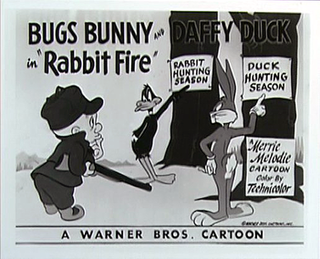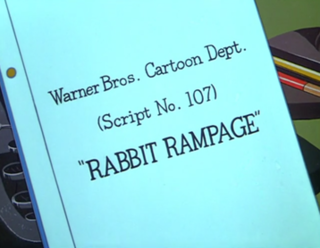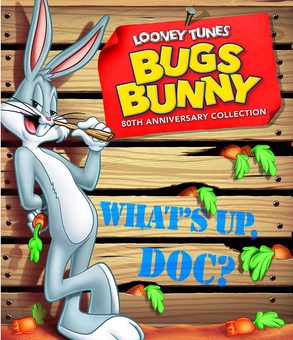Related Research Articles

Looney Tunes is an American animated franchise produced and distributed by Warner Bros. It began as a series of short films that originally ran from 1930 to 1969, concurrently with its partner series Merrie Melodies, during the golden age of American animation. Following a revival in the late 1970s, new shorts were released as recently as 2014. The two series introduced a large cast of characters, including Bugs Bunny, Daffy Duck, and Porky Pig. The term Looney Tunes has since been expanded to also refer to the characters themselves.

Duck Amuck is an American animated surreal comedy short film directed by Chuck Jones and written by Michael Maltese. The short was released on January 17, 1953, as part of the Merrie Melodies series, and stars Daffy Duck.

Hare Brush is a 1955 Warner Bros. Merrie Melodies animated short directed by Friz Freleng. The short was released on May 7, 1955, and stars Bugs Bunny and Elmer Fudd.

Rabbit Fire is a 1951 Looney Tunes cartoon starring Bugs Bunny, Daffy Duck, and Elmer Fudd. Directed by Chuck Jones and written by Michael Maltese, the cartoon is the first in Jones' "hunting trilogy"—the other two cartoons following it being Rabbit Seasoning and Duck! Rabbit, Duck! It is also the first cartoon to feature a feud between Bugs and Daffy. Produced by Edward Selzer for Warner Bros. Cartoons, the short was released to theaters on May 19, 1951 by Warner Bros. Pictures and is often considered among Jones' best and most important films.
A Wild Hare is a 1940 American animated comedy short film directed by Tex Avery, produced by Leon Schlesinger, and distributed by Warner Bros. as part of the Merrie Melodies series. The film was released on July 27, 1940, and features Elmer Fudd and Bugs Bunny, the latter making what is considered his first official appearance.
Rabbit Seasoning is a 1952 Warner Bros. Merrie Melodies cartoon directed by Chuck Jones. Released on September 20, 1952, the short stars Bugs Bunny, Daffy Duck and Elmer Fudd.

Duck! Rabbit, Duck! is a 1953 Warner Bros. Merrie Melodies cartoon directed by Charles M. Jones. The cartoon was released on October 3, 1953 and stars Bugs Bunny, Daffy Duck and Elmer Fudd.

The Scarlet Pumpernickel is a 1950 Warner Bros. Looney Tunes theatrical cartoon short, directed by Chuck Jones and written by Michael Maltese. The cartoon was released on March 4, 1950, and stars Daffy Duck along with a number of other prominent Looney Tunes characters. The title is a play on the 1905 novel The Scarlet Pimpernel.

Easter Yeggs is a 1947 Looney Tunes theatrical animated short. The cartoon was released on June 28, 1947, and features Bugs Bunny and Elmer Fudd. The title is a play on "Easter eggs" and on "yegg", a slang term for a burglar or safecracker. The voice and characterization of the Easter Bunny in the short is a reference to a character that Mel Blanc performed on the Burns and Allen radio show, the morose Happy Postman, even including the character's catch phrase, "Remember, keep smiling."

Jack-Wabbit and the Beanstalk is a 1943 Warner Bros. cartoon in the Merrie Melodies series, directed by Friz Freleng and starring Bugs Bunny, with all of the voices provided by Mel Blanc.

A Pest in the House is a Merrie Melodies animated short film released on August 2, 1947. It is directed by Chuck Jones and stars the characters of Daffy Duck and Elmer Fudd.

Rabbit Rampage is a 1955 Warner Bros. Looney Tunes animated cartoon, directed by Chuck Jones. The short was released on June 11, 1955, and stars Bugs Bunny.

Person to Bunny is a 1960 Merrie Melodies animated cartoon directed by Friz Freleng. The short was released on April 1, 1960, and stars Bugs Bunny, Daffy Duck and Elmer Fudd. It is the last cartoon to feature Arthur Q. Bryan as the voice of Elmer, and was released shortly after Bryan's death.
What Makes Daffy Duck is a 1948 Warner Bros. Looney Tunes cartoon directed by Arthur Davis. The cartoon was released on February 14, 1948, and stars Daffy Duck and Elmer Fudd.

A Star Is Bored is a 1956 Warner Bros. Looney Tunes cartoon, directed by Friz Freleng. The short was released on September 15, 1956, and stars Bugs Bunny and Daffy Duck. The cartoon expands upon the rivalry depicted between Bugs and Daffy, in such films as Chuck Jones' 1951 short Rabbit Fire, this time placing the action in a show-biz setting. In this 7-minute short, Daffy must double for Bugs in any slapstick that Warners deems too dangerous for its top star. After each disaster, Daffy shouts "MAKEUP!". The director directing the scenes has an Erich Von Stroheim accent.

This Is a Life? is a 1955 Warner Bros. Merrie Melodies animated cartoon directed by Friz Freleng, written by Warren Foster, and produced by Edward Selzer, with music directed by Milt Franklyn. The short was released on July 9, 1955, and stars Bugs Bunny. The voices were performed by Mel Blanc, Arthur Q. Bryan, and June Foray in her first work for Warner Bros. This is one of the few Bugs Bunny cartoons whose title does not contain Bugs, bunny, rabbit/wabbit or hare.

Elmer J. Fudd is an animated cartoon character in the Warner Bros. Looney Tunes/Merrie Melodies series and the archenemy of Bugs Bunny. His aim is to hunt Bugs, but he usually ends up seriously injuring himself and other antagonizing characters. He speaks in an unusual way, replacing his Rs and Ls with Ws, so he often refers to Bugs Bunny as a "scwewy" or "wascawwy (rascally) wabbit". Elmer's signature catchphrase is, "Shhh. Be vewy vewy quiet, I'm hunting wabbits", as well as his trademark laughter.

Bugs Bunny's 3rd Movie: 1001 Rabbit Tales is a 1982 animated comedy film by Friz Freleng. It combines classic Warner Bros. cartoon shorts with new animation, with Bugs Bunny serving as the story host.

Looney Tunes: Bugs Bunny 80th Anniversary Collection is a Blu-ray Disc box-set released by Warner Bros. Home Entertainment on December 1, 2020. It contains 60 Looney Tunes and Merrie Melodies shorts starring Bugs Bunny and numerous bonus features and supplementary content. The set's packaging includes a slip book, a booklet, and a collectible Bugs Bunny Funko! POP doll.
References
- ↑ Beck, Jerry; Friedwald, Will (1989). Looney Tunes and Merrie Melodies: A Complete Illustrated Guide to the Warner Bros. Cartoons. Henry Holt and Co. p. 269. ISBN 0-8050-0894-2.
- ↑ Lenburg, Jeff (1999). The Encyclopedia of Animated Cartoons. Checkmark Books. pp. 60–62. ISBN 0-8160-3831-7.
- ↑ @spongefan21 (22 October 2020). "@bunchasofties @C_A_P_" (Tweet) – via Twitter.
- ↑ Beck, Jerry (28 March 2023). "Warner Archive Collection Announces "Looney Tunes Collector's Choice" blu-ray – Animation Scoop". www.animationscoop.com. Archived from the original on 7 April 2023. Retrieved 7 April 2023.